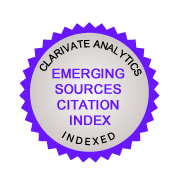NIGERIAN FEDERALISM: AN OVERVIEW OF ITS IMPERATIVES AND IMPEDIMENTS
DOI:
https://doi.org/10.32890/jis2021.17.8Abstract
This article provides an overview of Nigerian federalism in relation to the imperatives and impediments of its practice, which it has been grappling with since the constitutional enactment of the system in October, 1954. This study utilized qualitative research method by way of analyzing historical archives and documents, including secondary data sources. Historical documentation method was used as the principal analysis tool in this study. The study found that federalism remains the most viable system for Nigeria based on the past and present experiences amongst the former Nigerian military regimes, politicians, British colonialists, nationalists and founding fathers of the Nigerian state. However, there has yet to be a nationally accepted arrangement to be used in operating the country’s federal system. This is based on the heterogeneous nature and character of the Nigerian state. There are, however numerous impediments to the effective and efficient practice of federalism, including prolonged military rule, manipulation of religious differences and regional diversity, revenue and resource allocation politics and conflict, including poor intergovernmental relations. Thus, the search for a viable federal arrangement and its advancement continues to be explored.














